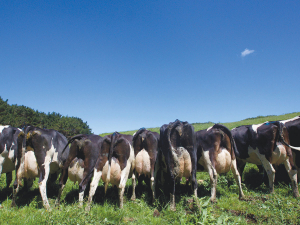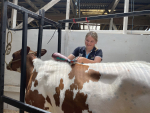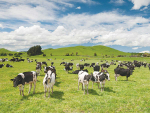Poor udder quality in many New Zealand cows contributes to them being culled in their first and second lactations, imposing an unsustainable cost, says a visiting expert.
Rebekah Mast, the genetic director for World Wide Sires, recently visited New Zealand.
She has worked with dairy producers in 40 countries.
Mast said NZ farmers told her that udder quality is their “number one issue”.
“Their investment in genetics isn’t playing out because the cows aren’t lasting in the herd. If that is widespread, it’s an issue for the NZ dairy industry, now poised to decrease numbers.”
Mast said the US cow herd had shrunk in the last 70 years from 25m cows to 9m today “yet in that time we’ve increased production”.
“That is being asked of the NZ farmer: reduce numbers while maintaining or increasing total production.
“The production capacity and earnings of the dairy industry cannot decrease but each cow has to be more efficient to reduce the industry’s environmental impact. The US has modelled that well but the NZ system is different.
“You need cows that can do that in a grazing situation. Farmers must ask ‘what is limiting us in achieving that goal?’ “
Mast said the NZ dairy industry of the future will need cows with udders capable of carrying a higher volume of milk, and this requires a greater focus on productive life and udder quality in the breed.
“North American breeding has basically spent the last 30 years identifying bulls that augment yield and udder quality. We have tried to identify sires with both traits.”
Farmers wanting to increase production or improve udders “cannot select a random bull but must instead make sire selections based on genetics which will improve your herd”.
Udder improvements are very heritable and reliable, Mast said.
“Right after the first generation you will see some impact: in improved fore-udder attachment and udder height and width.
“Many traits factor into longevity and profitability. You cannot say a shorter cow will be more profitable, because if her udder or feet do not hold up she won’t have longevity.
“The more similar the parents are the better we can predict what the next generation will be. We predict it a lot in our families, i.e. two parents who look very different will see a lot of diversity in their children versus parents who look very similar.
“And it’s the same in cattle. We cannot leave it to chance and crossbreeding. Simply putting a Jersey over a Holstein Friesian and vice versa is leaving it to chance.
“To be effective, cross breeding needs elite pure breeds. The genetic progress being made with Holsteins and Jerseys is better than it has ever been.”
Much better traitsin US holsteins
Rebekah Mast says udder traits “have made significant genetic progress in US Holsteins”.
“So that tells us that if you are looking for a population that can improve udders, Holsteins are the ones that will do that,” she said.
“World Wide Sires selects bulls specifically to resolve the issues being faced by NZ farmers, i.e. bulls with moderate stature siring daughters which are extremely fertile, have strength, strong functional traits, great udders and feet and very high production. These traits enable them to last multiple lactations.
“In reviewing cows to reduce numbers yet maintain or improve production you need to retain cows with the attributes which correlate to that outcome.
“Look at where the cow generates profit from. You want udders carried above the hock -- even as later lactation cows; high and wide rear udders; correct teat placement and length; rear legs well aligned and tracking straight from the rear; a wide rump for easy calving; and enough space to support a high producing udder.
“You need to select for all these things. And in NZ, where production is relatively low versus the rest of the world, you don’t need to go for extreme US bulls.
“Select sires that will resolve any conformation and production weaknesses, and generate a herd which will sustain and grow your business into the future,” Mast said.


















